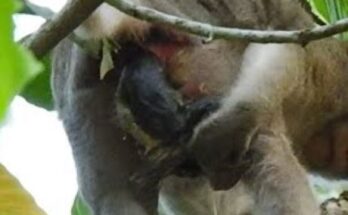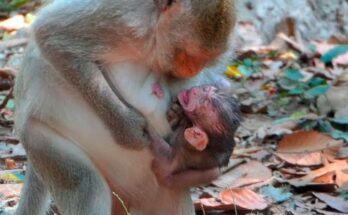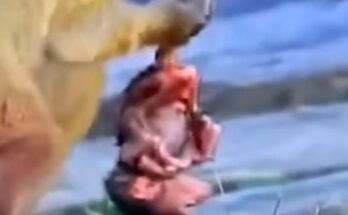Baby monkeys born with physical or developmental handicaps face immense challenges from the very beginning of their lives. In the wild, where survival depends on mobility, strength, and quick reflexes, being handicapped often means struggling to perform basic tasks necessary for life. These young primates may have difficulty climbing trees, holding onto their mothers, or foraging for food—critical skills for survival in their natural environment.
A baby monkey’s dependence on its mother is crucial in its early stages of life. For a handicapped infant, maintaining this bond can be exceptionally challenging. Newborn monkeys instinctively cling to their mothers as they navigate through trees or search for food. However, a physical disability, such as a weakened grip or limb malformation, can impede their ability to hold on tightly, putting them at risk of falling or becoming separated. In some cases, this can result in abandonment, as mothers may prioritize stronger, healthier offspring to ensure the survival of the group.
Additionally, handicapped baby monkeys face threats not just from environmental hazards but also from predators. A monkey unable to climb quickly or navigate dense foliage is far more vulnerable to attacks. Predators often target the weakest members of a group, and a visibly handicapped monkey is an easy target. This increased vulnerability can significantly shorten their life expectancy in the wild.
Social dynamics within monkey troops also present obstacles. Monkeys are highly social animals that rely on complex group interactions for safety, grooming, and learning survival skills. However, handicapped individuals may struggle to participate in these interactions, which could result in social isolation. In some cases, they may be subjected to aggression or neglect from other members of the group, as primates sometimes show less tolerance toward individuals perceived as different or weaker.
Life for a handicapped baby monkey is not entirely devoid of hope, though. In some primate species, particularly those with strong social bonds, mothers or other troop members may display remarkable care and adapt their behaviors to accommodate the handicapped infant. There are documented cases of troop members protecting and assisting weaker individuals, highlighting the depth of empathy and cooperation within primate societies.
Ultimately, the life of a handicapped baby monkey is an uphill battle against nature, societal dynamics, and survival pressures. These challenges underscore the harsh realities of life in the wild, where only the fittest—and sometimes the luckiest—survive.


